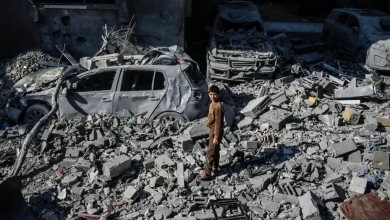Israeli warplanes have reportedly carried out hundreds of airstrikes across Syria, including strikes on the capital, Damascus, following the fall of President Bashar al-Assad’s regime.
According to the UK-based Syrian Observatory for Human Rights (SOHR), the Israel Defense Forces (IDF) have conducted more than 310 strikes since Sunday, targeting key military facilities across the country. These facilities include Syrian Army weapon warehouses, ammunition depots, airports, naval bases, and research centres.
Israel has stated that its military actions are aimed at preventing weapons from falling into the hands of extremists as Syria transitions into a post-Assad era.
The airstrikes have been reported across multiple cities, including Aleppo, Damascus, and Hama. Over 60 airstrikes were documented overnight between Monday and Tuesday, with many of the targeted facilities completely destroyed, not merely damaged.
Rami Abdul Rahman, the founder of the SOHR, commented on the scale of the strikes, stating that they had “destroyed all the capabilities of the Syrian army.” He also noted, “Syrian lands are being violated.”
In response to reports of Israeli troops entering Syrian territory, the IDF denied any incursions, telling the BBC that reports of tanks near Damascus were “false.” An IDF spokesperson clarified, “IDF troops are stationed within the buffer zone, as stated in the past.”
On Monday, the Israeli military released photographs of its troops crossing from the Israeli-occupied Golan Heights into the demilitarized buffer zone in Syria, where UN peacekeepers are stationed. Israeli Prime Minister Benjamin Netanyahu explained that the IDF’s presence in the buffer zone was a “temporary defensive position until a suitable arrangement is found.”
“If we can establish neighborly relations and peaceful relations with the new forces emerging in Syria, that’s our desire,” Netanyahu said. “But if we do not, we will do whatever it takes to defend the State of Israel and the border of Israel.”
Israeli Foreign Minister Gideon Saar, when asked about the airstrikes, emphasized that Israel’s primary concern was the defense of its citizens. “That’s why we attack strategic weapons systems like, for example, remaining chemical weapons or long-range missiles and rockets, in order that they will not fall into the hands of extremists,” he said.
On Monday, the UN’s chemical weapons watchdog urged Syrian authorities to ensure the safety of any suspected chemical weapons stockpiles in the country. While the exact locations and quantities of Syria’s chemical weapons are unknown, it is believed that former President Bashar al-Assad maintained such stockpiles during his rule.
The Israeli strikes follow the capture of Damascus by Syrian rebel fighters and the subsequent toppling of Assad’s regime over the weekend. Forces led by the Islamist opposition group Hayat Tahrir al-Sham (HTS) entered the capital in the early hours of Sunday, later appearing on state television to announce that Syria was now “free.” Assad and his father had ruled Syria since 1971.
